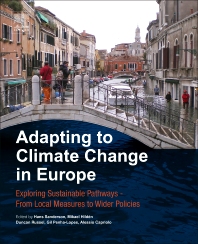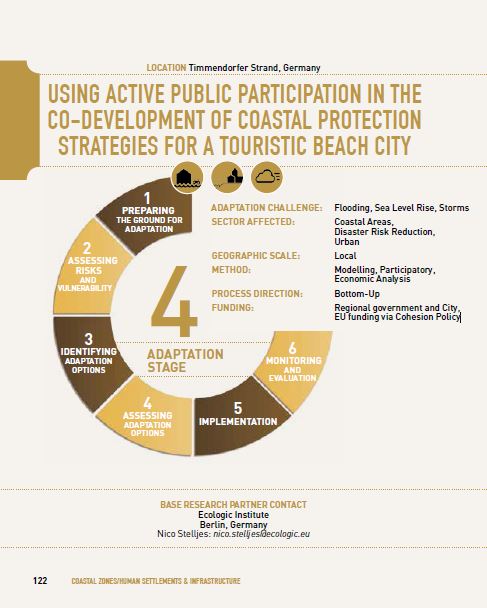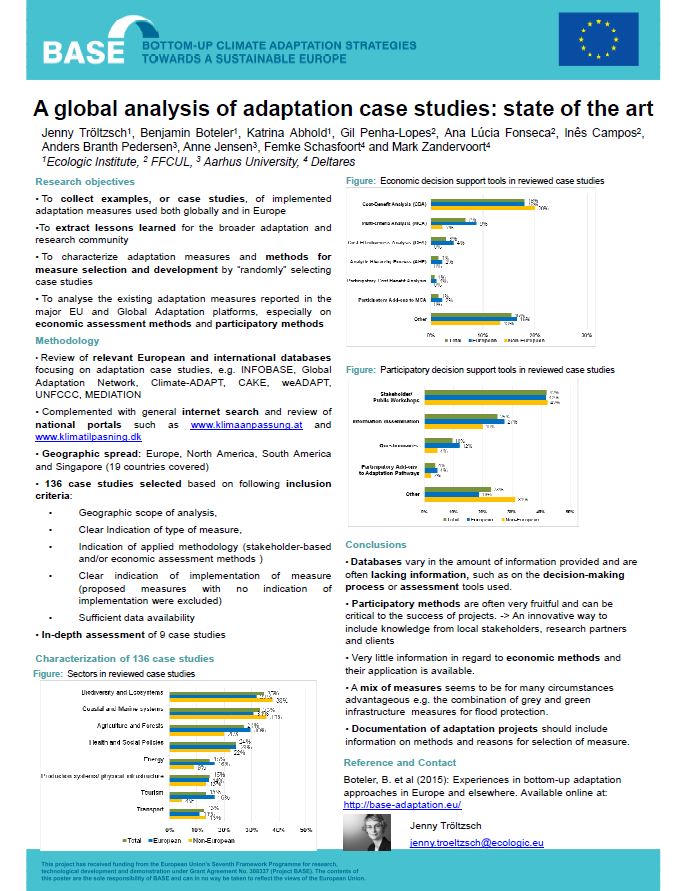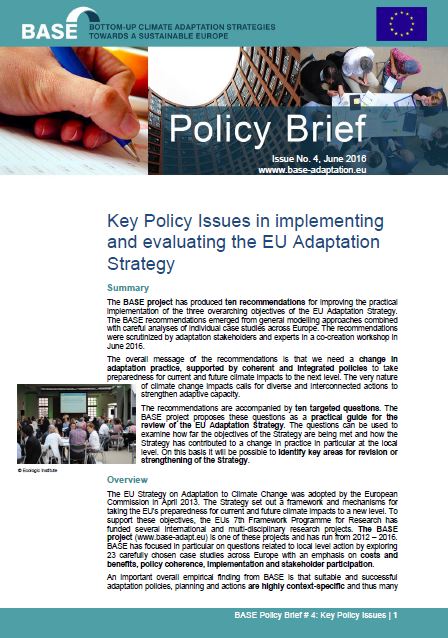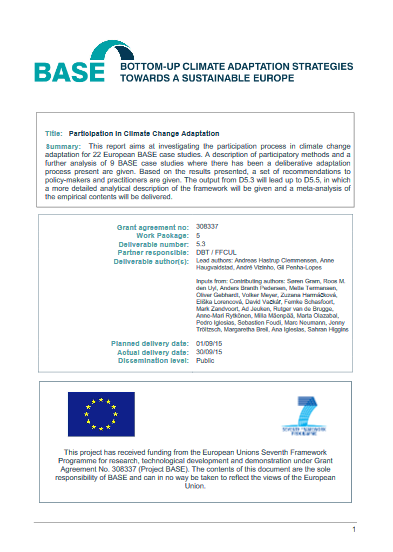European Climate Change Adaptation (ECCA) Conference 2015
- Event
- Date
-
-
- Location
- Copenhagen, Denmark
The ECCA 2015 covered a range of issues related to climate adaptation under the theme, "Integrating climate adaptation action in science, policy, practice, and business." The three-day conference took place from 12 to 14 May 2015 in Copenhagen, Denmark. The conference also featured a poster commercial, as well as three State of Green Tours to see innovative, local adaptation activities in action.
The aim of the conference was to consolidate and create a European platform for interactions among scientists, practitioners, policymakers businesses and European and international organisations about climate change adaptation. The conference attracted 760 participants from 46 different countries across all groups. Over 100 students were also in attendance.
ECCA 2015 was organised on behalf of the European Commission by three major European climate adaptation research projects: BASE (link is external), RAMSES (link is external) and ToPDAd (link is external), under the coordination of Aarhus University and Ecologic Institute. Among the sponsors were the Confederation of Danish Industry, the City of Copenhagen, the European Environment Agency and the official conference airline SAS (providing carbon offsets).
The opening and the closing sessions featured high-ranking keynote speakers, including: Kurt Vandenberghe, European Commission; Hans Bruyninckx, European Environment Agency; Tine Roed, Deputy Director General at The Confederation of Danish Industry; Jens Hesselbjerg Christensen, The Danish Meteorological Institute (DMI); Frans Berkhout, Kings College, London; Jiang Tong, China Meteorological Administration; Claus Kondrup, European Commission's Directorate-General for Climate Action; Linda Romanovska, Mayors Adapt; Sarah Hendel-Blackford, Ecofys, UK; Connie Hedegaard, KR Foundation; Rasmus Valanko, WBCSD; Bente Pretlove, DNV GL; Jean Palutikof, Griffith University; Hans von Storch, Helmholtz Zentrum Geesthacht; Panos Fetsis, EU Life Projects – AIEDL; Henk Ovink, International Water Affairs, the Netherlands; Amanda Cockroft, Climate-KIC Nordic. In addition, a group of 30 ninth graders from a local school hosted a workshop, where they delivered a stunning message at the closing session of ECCA 2015. Two musical performances energised the sessions: Mohammad Reza Mortazavi on percussion and Behnam Shirazi on guitar.
Over the three days, nine mid-day plenary presentations, 66 parallel sessions, 23 workshops and a multi-day poster exhibition took place. Two sessions featured the European Commission’s policy initiatives on climate services and nature-based solutions, as well as their funding on Horizon 2020.
In total, more than 600 authors presented their work on adaptation and mitigation related topics, including business, economics, urban adaptation, sectoral adaptation, infrastructure, governance, social sciences and participation, climate services, risks and region-specific issues. The quality of the scientific and practical presentations, as well as of the workshops and posters were excellent. Younger researchers were able to present their work and engage in networking. The gender split among participants in the panels at the Opening and Closing sessions) was very close to 50/50.
On Tuesday 12 May 2015, three site visits were organised by State of Green: a tour to Køge Bugt Beach Park, one of Denmark's largest climate adaptation projects; a visit to St. Kjelds Quarter, Copenhagen's first climate adapted neighbourhood; and a tour to Musicon Rabalder Parken, functioning as a climate adaptation solution to withstand storm water.
A broad range of communication activities ensured visibility to the conference and adequate outreach. Background information was made available through the conference website and leaflet. Updates on the programme and calls for proposals and papers were promptly announced via the Twitter account, which also ensured live coverage of the event. A series of press releases were produced and distributed in the preparation phase.
Within the BASE Project, Ecologic Institute leads the uptake, transfer, and dissemination of the knowledge produced by BASE. In addition, Ecologic Institute coordinates engagement with stakeholders on the impacts, costs, and benefits of adaptation. In this role, and in cooperation with its sister projects RAMSES and TopDad, it coordinated the Scientific Programme Committee in charge of the development of the ECCA 2015 programme.
In particular, as one of three European adaptation projects organising the conference, BASE researchers played a major role in the activities at ECCA 2015. Overall, BASE researchers were involved in chairing nine sessions, one workshop as well as presenting BASE results in several presentations and posters. Among these sessions were the following:
- 'Economic Instruments of Adaptation' presented six different instruments aimed at supporting decision-making processes.
- 'Ecosystem-based Approaches to Adaptation and Disaster Risk Reduction' session presented how ecosystem-based approaches should become an inseparable component of adaptation planning and strategies.
- 'Climate Change and Public Health' session highlighted the direct and indirect effects of climate change on the public.
- 'Safeguarding our Shores: Social and Cultural Dimensions of Coastal Climate Change Adaptation in Europe and the United States' concluded that cultural values drive risk perception, response preparedness and must therefore be strongly acknowledged in policy and science.
- 'The role and use of participatory methodologies in climate change adaptation' was a BASE workshop highlighting how the use of participatory methods can be a fundamental piece in conflict resolution, stakeholder engagement and citizen involvement towards a common vision.
Other sessions included:
- Multi-level government and climate change adaptation: reconciling bottom-up and top-down perspectives?
- Adaptation policies and measures in the Mediterranean region.
- Decision support in climate change adaptation – Supply and demand side perspectives.
- An integrated perspective on climate change adaptation and mitigation. Insights from global economic models.
- Drawing lessons from national experiences of adaptation planning and strategy making.
The exhibition booth, hosted by the BASE project, provided a space for sharing printed materials, networking and informative discussions.
At the booth, the latest BASE video on climate change challenges was showcased, and can be viewed here:
BASE also announced a training course on adaptation to be held in Portugal from 28—31 October 2015. The course is aimed at adaptation practitioners and will cover topics like Integral Economic Analysis (CBA, CEA, MCAs), Participatory Aspects in Adaptation Processes, and Implementation Analysis. More information is available on the Base Adaptation Website (link is external).
The ECCA 2015 conference showed that synergy between more EU projects could help consolidate the European climate change adaptation community. More efforts are needed to integrate the business community, as the integration between adaptation and disaster risk reduction is still only starting to emerge.
The ability to reduce climate related uncertainties allows for risk-based decision-making, strategic investments based on careful assessments and, sometimes, bold decisions and actions.
The next ECCA 2017 will be held 6—8 June 2017 in Glasgow, Scotland and will be chaired by Dr. Paula Harrison, Oxford University.
The detailed conference programme is still available here (link is external).



